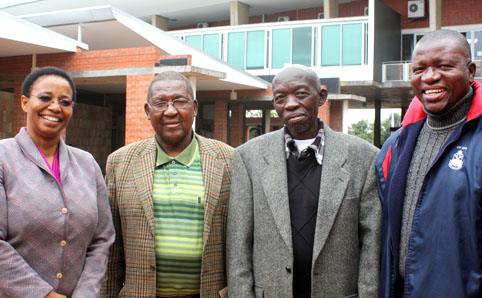 |
| At the lunch were, from the left: Dr Choice Makhetha, Vice-Rector: External Relations (acting); Mr Norman Mathobisa and Mr Victor Mahatanya, both founder members of the Bloemfontein Celtic Soccer Club; and Mr Billy-Boy Ramahlele, Director: Community Engagement at the UFS. |
In this year, the University of the Free State (UFS) will recognise two of the founder members of the Celtics Soccer Club in Bloemfontein, Mr Norman Mathobisa and Mr Victor Mahatanya, for establishing one of the greatest soccer clubs in South Africa.
The Vice-Rector: External Relations (acting) at the UFS, Dr Choice Makhetha, and Mr Billyboy Ramahlele, Director: Community Engagement, recently had lunch with Mr Mathobisa and Mr Mahatanya. “As the university has a partnership with the Celtics Soccer Club, we would like to make an effort to get to know the founder members of this club better,” said Dr Makhetha.
At the lunch meeting Mr Mathobisa and Mr Mahatanya shared their experiences and other involvement in sport in the Free State over their lifetime.
Mr Norman Mathebula also serves on the Mangaung University Community Partnership Project (MUCPP) Committee who is working in partnership with Standard Bank in giving loans to SMME businesses.
Mr Mickey Gordon, Head: Corporate Affairs, Institutional Advancement and Sport at the UFS, is managing the working relationship with the Celtics Soccer Club. In terms of this agreement the soccer club, will amongst others, support Kovsie soccer players with skills development and hey will also conduct talent scouting.